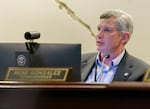This week, the Portland City Council unanimously passed a drug use criminalization ordinance, crafted by Commissioner Rene Gonzalez and Mayor Ted Wheeler. The measure would ban the public use of drugs like fentanyl and meth only if the Oregon Legislature changes a state law. City Council also directed its lobbyists to push for that legislative change. Public safety and homelessness were among the top issues that Gonzalez campaigned on, and likely the issues that swept him into office last November.

Commissioner of Public Safety, Rene Gonzalez, during a meeting of the Portland City Council, May 31, 2023.
Kristyna Wentz-Graff / OPB
Gonzalez recently joined OPB’s “Think Out Loud” for a conversation about public safety. Below are excerpts
The goal of this ordinance
“The idea is ultimately that people are getting treatment. I wanna be crystal clear. This is a good criminalization step. But our goal is to get the people who need the treatment, the treatment under our system. The court system has been an effective way to compel treatment in the past. Many will argue that volunteer is more efficient. I don’t necessarily dispute it, but this is another means to get people into treatment … we’re really hoping that once we have the ability to do this, we can start accelerating people going into drug courts which drives them to addiction services … what’s important for police is the ability to book, and usually that’s going hand in hand with some sort of public consumption in conjunction with some other negative behaviors.”
Why this ordinance is necessary
“First and foremost, this is a response to Portlanders that were outraged by public consumption — witnessing in front of their children, breathing the fumes — this is a response to voters and our citizens reaching out to us with deep, deep concern about this. And frankly, the city and the community has a right to have a say on what goes on in the right of way. And that’s including whether that’s the user or the non-user. We all have a stake in when it occurs in our common areas.”
“I would also submit that we’ve taken a number of steps in recent years including Measure 110 to destigmatize public drug use. And we were promised if we destigmatize that, that would lead to better health outcomes. We’re not seeing those better outcomes … treating addiction as a disease that has not led to better outcomes anywhere on the West Coast. From my vantage point, we are amidst a major national crisis on and regional crisis on overdoses. We have done what the advocate said, we have destigmatized. We have allocated substantial dollars towards addiction services which I continue to fully support. I mean, that’s one part of Measure 110 I am all on board with is putting as many dollars towards addiction services as we can, but it has not led to the positive health outcomes we were promised. So I think it’s fair to push back on that.”
On Portland Street Response
“Well, it’s a great program to efficiently find non-police intervention for those in mental distress. And mobile response is finding another way to get people to de-escalate, ideally connect them with services, although that sometimes is elusive, depending on whether the recipient is willing to take those services at that time. But it has added some efficiency in our system for certain types of police calls.”
“The medical side is a little bit more elusive. We’re still working on actually trying to deepen their medical capabilities, deepen ties in with our program called CHAT, which is low acuity medical outreach for Portland Fire. [Portland Street Response] is really on the behavioral health side, CHAT is on the low acuity medical side, and these are both strains on our system. So they originally were solving two separate problems. Where we’re kind of seeing, however, is that merging the two together may have some real benefits because often there is a combination of behavioral health needs and low acuity medical at any given time.”
Related: Former Portland Street Response manager blames exit on city leadership shortfalls
Upcoming changes in city government, running for mayor
“Candidly, right now, a purely legislative role is not particularly attractive. It’s not really what I ran for initially. And so all things are on the table. Public service is a tremendous sacrifice for families. I think some things we knew going in, some things we didn’t. So we’re gonna continue to evaluate our next steps.”
You can listen to the whole conversation with Rene Gonzalez on “Think Out Loud” by pressing the play arrow above.
